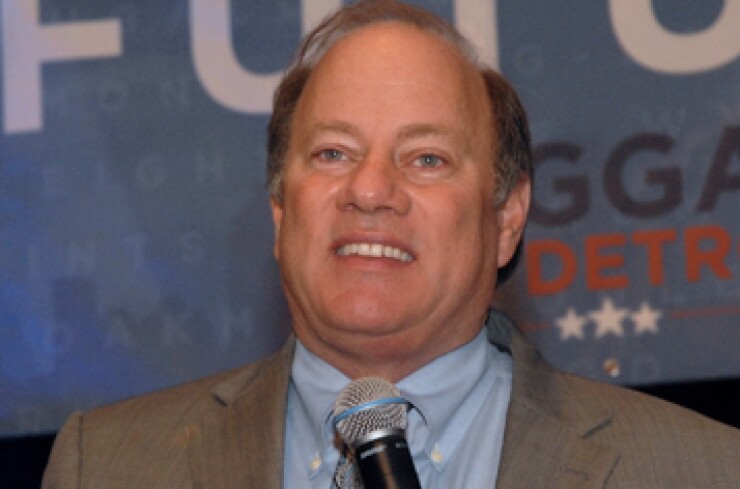
CHICAGO -- Detroit will price its first post-bankruptcy borrowing Wednesday after a full-court press on investors.
The deal team wants to sell the market on the sturdiness of state-crafted protections that garnered an investment-grade rating for the deal despite the city's underlying speculative-grade ratings.
Several investors said the safeguards that won the deal an A rating from Standard & Poor's will lure sufficient interest but the city still faces a steep yield penalty given deep market skepticism over the city's fiscal wherewithal.
The Michigan Finance Authority will sell $245 million of local government loan program revenue bonds on behalf of the city in two tranches. One is for $135 million of tax-exempt securities that mature between 2020 and 2029 and another for $110 million of taxable paper maturing between 2018 and 2022. Barclays is the underwriter.
On a tax-exempt term bond due in 2029, several market participants said preliminary pricing scales put the yield at 4.75%, about 225 basis points over the Municipal Market Data's top-rated benchmark and 150 basis points over an A-rated one. The taxable piece with an average five-year life was expected to price at about 300 basis points over comparable Treasuries, market sources said.
"It's not a bad deal for the city. Everybody's got a short memory," said one buyside representative, referring to the steep haircut many bondholders suffered before Detroit exited Chapter 9 late last year.
The debt is enhanced with a statutory lien and intercept feature on the city's income taxes. The protections, combined with debt-service coverage levels of 6.5 times, won the investment-grade rating from Standard & Poor's.
Investors say they are wary of two chief risks: the income tax revenue is highly concentrated, hinging on the city's fragile recovery; and that it's unknown how a statutory lien and trust would play out in a federal courtroom if Detroit ends up in Chapter 9 again.
"The statutory lien and enhancements the underlying structure appear strong, but we're of the opinion that the same economic and employment forces that drove the city downward in the past can still have an effect on this deal," Michael Johnson, head of research for Gurtin Fixed Income Management, said in a recent interview. "The economic forces around this give us pause."
The new pledge giving bondholders a superior, statutory lien on income tax revenue, which Gov. Rick Snyder signed into law in April, marks a first for Detroit or any Michigan borrower. The law also exempts the revenue held in trust from being levied upon, sequestered or applied toward any other debts.
City finance team members sought to offset concerns over how the pledged revenues would be treated in Chapter 9 during an investor presentation in New York City last week. The presentation was then posted as an attachment to the deal's preliminary offering statement. The finance team has since held one-on-one investor interviews.
Detroit's bond counsel, Miller Canfield Paddock & Stone PLC, said it considers the trust mechanism the stronger of the two protections for those investors concerned about how debt would be treated in a future bankruptcy. The pledged income tax revenues are subject to the statutorily created trust that is expected to keep the revenue out of play in a potential future bankruptcy filing. The firm offered a "reasoned opinion" on the subject and attorney Amanda Van Dusen told investors the firm believes the trust ensures that the revenues would not be considered part of the debtor's estate.
Bond documents make clear, however, there's no guarantee.
"The bankruptcy court would not be bound by legal opinions other than binding precedent, and there currently is no binding precedent regarding these matters," the documents say. "Thus, the opinion of bond counsel to the city is not (and cannot be) a guaranty that the pledged income tax revenues would be treated as subject to a statutory trust or lien."
The 80-minute investor presentation offered information from city Mayor Michael Duggan, top finance officers, finance team members, and the head of an oversight commission.
The presentation attempts to sell bondholders on the debt by selling them on their strategies on the city's post-Chapter 9 turnaround efforts, continued oversight provided by the Financial Review Commission, and strong bondholder protections, coverage and reserves.
The commission's chief, Ronald Rose, stressed its oversight of city financial plans, debt issuance, contracts, and noted that the city's chief financial officer can't be fired without the commission's approval and must sign off on a replacement.
Duggan highlighted strides in restoring streetlights, removing debris, improving bus service, and promoting the rehabilitation of abandoned housing. "I hope you will decide we have a future," Duggan told potential investors.
The deal is the Motor City's first public bond sale since it exited the largest municipal bankruptcy in the country last December after shedding $7 billion in obligations. Proceeds from the deal will largely be used to repay Barclays for a $275 million loan that financed the bankruptcy exit.
The coverage is projected at 6.5 times or higher based on 2014 collections and monthly coverage of maximum annual debt service has not been less than 2.85 times in the past three years, according to S&P.





